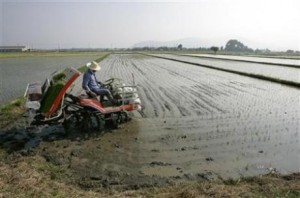The Australian October 08, 2010
The Australian | October 08, 2010
Rick Wallace
Japan's threat to regulate foreign ownership of land in Japan has sent ripples of concern through the property market.
IT may have been an impromptu thought bubble, but Japanese Foreign Minister Seiji Maehara made the comment during a televised political debate last week at the height of Japan's row with China over the Senkaku Islands.
His comment also came amid increasing investment from China, South Korea and other countries in Japanese commercial property, forests and land.
Mr Maehara said the government needed "to consider some sort of measures" to deal with the issue, including legislation. He acknowledged the need to tread carefully, saying "foreign investment, economic activity could be adversely affected".
Japan has no real restrictions on foreign ownership of property and with the domestic economy still in a slump, foreigners are among the main buyers.
Unlike Australia, Japan has no foreign investment review board oversight of property transactions, and poor systems for recording foreign purchases.
Chinese interests have been buying up tracts of forests on the central island of Honshu and on the northern island of Hokkaido, and South Korean buyers have bought land alongside a defence facility on the disputed island of Tsushima, halfway between Japan and Korea.
The thought of China controlling forests in the water catchments of Japanese cities and Koreans staking a claim to Tsushima has awoken a nationalistic backlash in Japan that threatens to gather strength at a time of strong regional tension.
In the main, the minister's comments seem aimed at controversial purchases rather than the regular commercial property market, which depends heavily on foreign capital.
But Japaninvest research partner Mark Brown warned the remarks risked crushing a nascent recovery in the sector.
Mr Brown said real estate investment trusts and foreign buyers were just starting to breathe life into the market again.
"We have had reports from The Financial Times and Nikkei about Chinese buying," he said.
"We have heard that Australians are selling condos to Chinese who come over here to ski. I think the government would be crazy to talk about restricting investment in properties, because that's what's needed here. I would think that most sellers here would be delighted to sell to Chinese buyers."
Any restrictions would be difficult for the commercial property sector, he said, but he suspected most people would interpret the minister's comments as "grandstanding".
Eriko Yamatani, an opposition MP who is head of the Japan's bipartisan Parliamentary Federation for the Protection of Japanese Territory, said new laws were needed to restrict foreign ownership.
"It is my belief that there should be regulations imposed by the government and/or municipality for lands which are critical for security, natural resource preservation and cultural conservation," she said. "I understand that many of countries have got regulations on foreign land transactions. I believe that it is the role of politicians, to protect the territory."
Despite the row with China, Ms Yamatani said she did not support singling out particular countries.
"Regulations should be consistently aimed to protect our territory, sovereignty and citizens of the state. So I believe we should give the same conditions to all countries, without tightening or loosening the conditions depending on the country."
Confused record keeping makes it hard to get a sense of how much property foreign buyers have bought in Japan, but the Hokkaido government said foreign companies or individuals bought a total of 406ha of forests on the island last year.
For many purchases, however, the buyer's nationality was not known or not recorded and the true total was likely to be higher.
According to media reports, buyers from China and other parts of Asia have been purchasing ski resort hotels and tourist properties in other parts of Japan, and Japanese real estate companies have been increasingly pitching their offerings to China-based individuals or companies.
Foreign ownership of watersheds or agricultural land plays into the perennial food security fears that are common in a nation forced to import about 60 per cent of its food.
The Japanese government might get some domestic sympathy for plans to restrict forest and agricultural ownership, but its critics argue Japan's forests are poorly managed and unproductive, and its stance is hypocritical given Japan's large and sometimes controversial investments in forestry in other countries.
Japan will need foreign investment in a range of areas to revive its economy and rebuild infrastructure, and new restrictions risk sending the wrong message to offshore investors, even if the government eventually clarifies Mr Maehara's remarks to restrict them to particular sectors or geographic areas.
Similarly, Japanese companies are increasingly looking abroad for profit growth amid domestic stagnation. If moves to restrict capital flows are reciprocated in other countries, this will be become harder.
Japan's property sector shaken by threat to foreign investment
- Tags: Japan
-
 The Australian
The Australian
- 08 October 2010
Who's involved?
Whos Involved?
Carbon land deals
Dataset on land deals for carbon plantations
07 Oct 2025 - Cape Town
Land, life and society: International conference on the road to ICARRD+20
Languages
- Amharic
- Bahasa Indonesia
- Català
- Dansk
- Deutsch
- English
- Español
- français
- Italiano
- Kurdish
- Malagasy
- Nederlands
- Português
- Suomi
- Svenska
- Türkçe
- العربي
- 日本語
Special content
Archives
Latest posts
-

KKR acquires ProTen from Aware Super
- Business Wire
- 01 July 2025
-

CAR offers land ownership using cryptocurrency
- IT Web
- 23 June 2025










